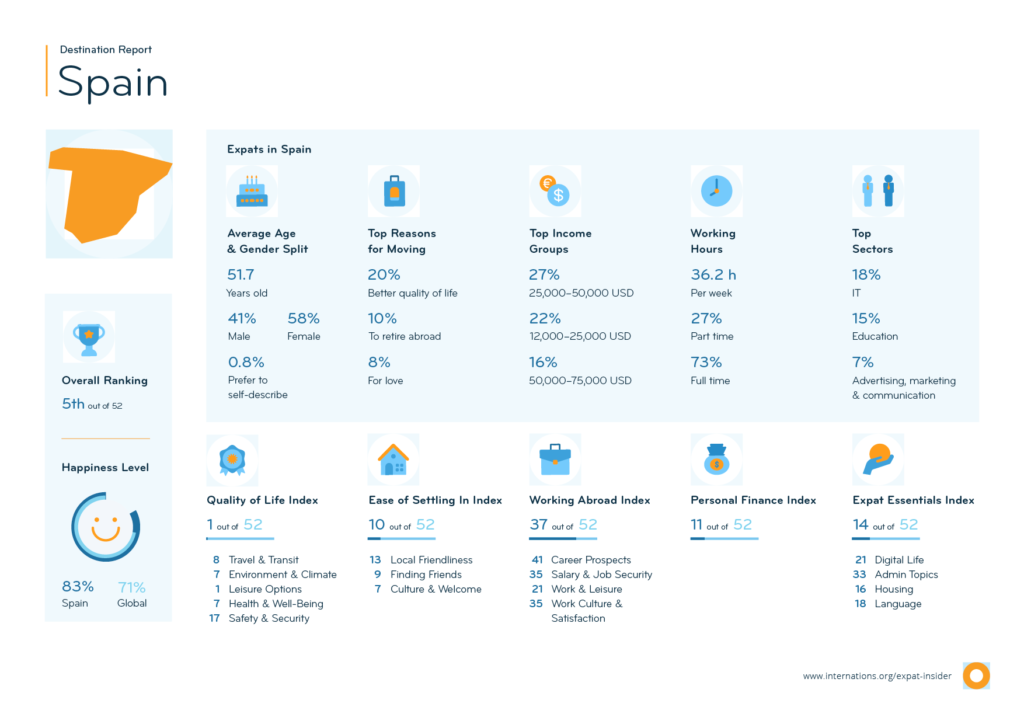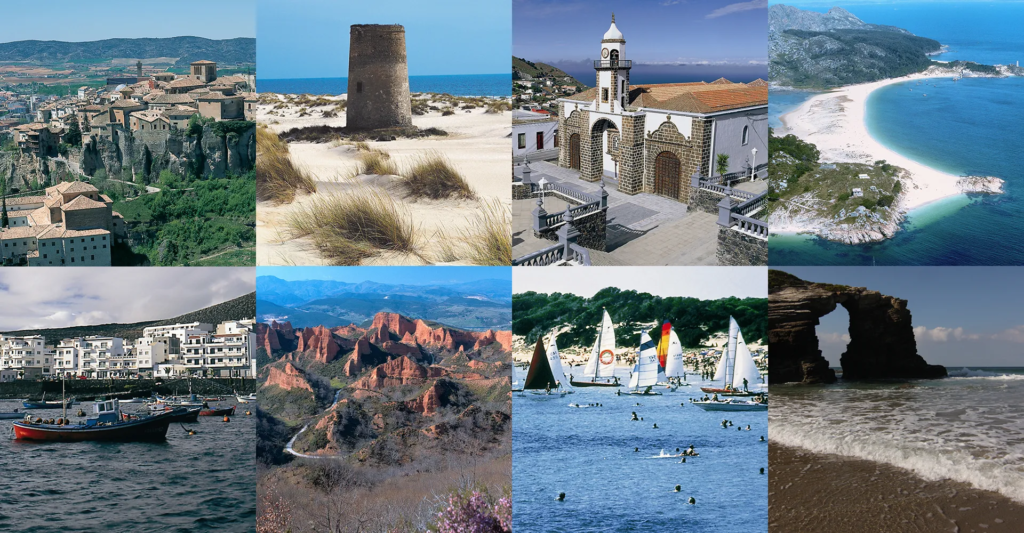Spain, a country known for its rich history, vibrant culture, stunning landscapes, and warm climate, has become an increasingly popular destination for expats. Whether you’re seeking a new adventure, a change in lifestyle, or a more affordable way of living, Spain offers something for everyone. In this article, we’ll explore why moving to Spain could be one of the best decisions you make, covering key aspects such as the cost of living, quality of life, cultural richness, healthcare, education, and more.
1. Affordable Cost of Living

One of the most appealing reasons to move to Spain is the relatively low cost of living compared to other Western European countries. If you’re coming from the U.S., the U.K., or northern Europe, you’ll likely find that your money goes much further in Spain. From housing to groceries and dining out, Spain offers a high quality of life without the steep price tag.
Housing: Rent prices in Spain vary depending on the city or region, but on average, you can expect to pay around €700 to €1,200 per month for a one-bedroom apartment in cities like Madrid or Barcelona. In smaller cities or rural areas, rent can drop to as low as €400 to €600 per month. To put this into perspective, renting a similar apartment in Paris or London could easily cost over €2,000 per month. Additionally, buying property in Spain is more affordable than in many other European countries, with average home prices around €1,800 per square meter.
Groceries and Dining: The cost of groceries in Spain is also considerably lower than in many other Western countries. A weekly shopping trip for a family of four can cost between €80 and €150, depending on the products and region. Dining out in Spain is a joy and much more affordable, with the average price for a meal at a mid-range restaurant ranging between €10 and €20 per person. A glass of wine or beer will typically cost you around €2 to €3, making dining out an everyday pleasure rather than a luxury.
Utilities and Transportation: Utilities, including electricity, water, and heating, will typically cost between €100 and €150 per month for a standard apartment. Public transportation is widely available and inexpensive, with monthly passes in major cities costing around €40 to €60. Fuel prices are comparable to the rest of Europe, but the availability of public transit makes owning a car unnecessary in many cities.
2. Exceptional Quality of Life

Spain consistently ranks high in quality of life indices, and it’s easy to see why. Spaniards enjoy a slower pace of life compared to other fast-paced Western cultures, which translates into less stress and more time to appreciate life’s pleasures. Whether it’s the famous siesta, which allows for a mid-day break, or the long, leisurely meals with friends and family, Spaniards know how to prioritize relaxation and enjoyment.
Climate: One of Spain’s biggest draws is its Mediterranean climate. With over 300 days of sunshine in many regions, such as the Costa del Sol and the Canary Islands, Spain offers year-round good weather. Winters are mild in most parts of the country, especially in the southern regions, while summers can be hot but are perfect for beach lovers.
Work-Life Balance: Spain places a strong emphasis on work-life balance. While the typical workweek is 40 hours, many businesses close during the afternoon for siesta, allowing employees to rest and recharge. In addition, Spaniards value their weekends and holidays, spending time with family, enjoying meals, and taking part in outdoor activities.
Healthcare: Spain’s healthcare system is one of the best in the world, offering both public and private options. The public healthcare system is funded by taxes, meaning that residents, including expats, can access it for free or at a low cost. According to the World Health Organization, Spain ranks in the top 10 for healthcare, thanks to its highly skilled medical professionals and modern facilities. For those who prefer private healthcare, private insurance can cost between €50 and €150 per month, depending on age and coverage.
3. Rich Culture and History

Spain’s cultural and historical heritage is vast and varied, making it an incredibly rich place to live. From world-renowned artists like Picasso and Gaudí to ancient Roman ruins and Moorish palaces, the country is steeped in history and artistic achievements.
Festivals and Traditions: Spain is famous for its festivals, such as La Tomatina, the Running of the Bulls, and Semana Santa. Each region in Spain has its own unique traditions, offering a blend of Christian, Moorish, and Roman influences. Spaniards love to celebrate, and there are countless opportunities to experience these festivals, where music, dancing, and food are at the heart of the festivities.
Art and Architecture: Spain is home to some of the most iconic architectural wonders in the world, from the Alhambra in Granada to Antoni Gaudí’s Sagrada Família in Barcelona. Museums such as the Prado in Madrid or the Guggenheim in Bilbao are must-visits for art lovers, showcasing works from the country’s illustrious artistic history.
Cuisine: Spanish food is another highlight, offering a culinary experience that is both diverse and delicious. Each region has its own specialty, from tapas and paella in Valencia to jamón ibérico in Andalusia. The Mediterranean diet, known for its health benefits, is a cornerstone of Spanish cuisine, featuring olive oil, fresh vegetables, seafood, and meats.
4. Strong Expat Community

Spain is home to a large and growing expat community, making it easier to settle in and make connections. Whether you choose to live in the bustling cities of Madrid or Barcelona or prefer the coastal charm of Alicante or Marbella, you’ll find a welcoming community of people from all over the world.
Expats in Spain often form their own networks through online groups, meet-ups, and language exchange programs. Many cities have international schools, making Spain an attractive option for families with children. Additionally, Spain’s relatively relaxed immigration policies, including the Non-Lucrative Visa and the Golden Visa, make it easier for non-EU citizens to move to and live in the country.
5. Excellent Education System

Spain’s education system is another reason why many families choose to move here. Spain offers both public and private schooling options, with public schools being free for residents and often highly rated. The country also has a strong tradition of international schools, particularly in larger cities and expat-heavy regions, where children can study in English, French, or other languages alongside Spanish.
Spain is home to some prestigious universities, including the University of Barcelona and the Complutense University of Madrid. For those interested in higher education, tuition fees in Spain are relatively affordable compared to other European countries, with annual fees typically ranging between €1,000 and €2,000 for public universities.
6. Stunning Natural Beauty

Spain’s diverse landscapes are another major draw for those looking to relocate. Whether you’re a beach lover, a mountain enthusiast, or someone who enjoys the countryside, Spain offers a variety of natural environments to explore.
Beaches: Spain boasts over 5,000 kilometers of coastline, with some of the best beaches in Europe. The Costa del Sol, the Balearic Islands, and the Canary Islands are known for their pristine beaches, clear waters, and stunning views. Whether you’re looking to surf, sunbathe, or explore hidden coves, Spain’s beaches have something for everyone.
Mountains and Countryside: If you prefer mountains to beaches, Spain doesn’t disappoint. The Pyrenees, the Sierra Nevada, and the Picos de Europa offer excellent hiking, skiing, and outdoor adventure opportunities. Spain’s countryside is dotted with charming villages and vineyards, making it a perfect place for those who want to escape the hustle and bustle of city life.
7. Easy Travel and Connectivity

Spain’s location in southern Europe makes it an ideal base for exploring the rest of the continent. With well-connected airports in cities like Madrid, Barcelona, and Málaga, traveling to other European countries is both easy and affordable. Low-cost airlines like Ryanair and Vueling offer frequent flights to destinations all over Europe, making weekend getaways or short trips accessible.
Additionally, Spain’s high-speed train network, the AVE, connects major cities across the country, allowing for fast and convenient domestic travel. For example, a trip from Madrid to Barcelona takes just under three hours by train. The country’s extensive public transportation system, including buses and metro services, ensures that getting around within cities is hassle-free.
8. Safety and Security

Spain is considered one of the safest countries in Europe, with low crime rates compared to other Western nations. Violent crime is rare, and most residents and expats feel secure in both urban and rural areas. Petty crimes like pickpocketing can occur in tourist-heavy areas, but common sense precautions can prevent most issues.
Moreover, Spain has a robust legal system and a strong police presence, ensuring that residents feel safe and protected. The country’s laid-back and friendly culture also contributes to a general sense of well-being among locals and expats alike.
Why Move to Spain?
Spain offers an incredible quality of life for those looking to relocate. Whether you’re attracted by the affordable cost of living, the sunny climate, the rich culture, or the welcoming expat community, Spain is a country that has something for everyone. Its mix of history, modern amenities, and a laid-back lifestyle makes it an appealing destination for individuals, families, and retirees alike.
From the bustling streets of Madrid to the tranquil beaches of the Costa Brava, Spain is a place where you can find balance, beauty, and a sense of belonging. If you’re considering a move, Spain might just be the perfect place to call home.
Read more: Popular festivals in Spain




